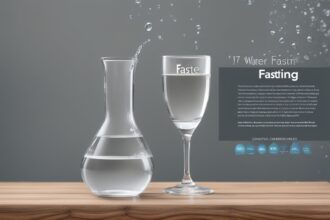Have you ever considered taking a break from food to reset your body and mind? Water fasting, a practice where you consume only water for a set period, has gained popularity for its potential health perks. While it might sound daunting, the water fast benefits are backed by both ancient traditions and modern science. From weight loss to improved mental clarity, this age-old method offers a unique way to detox and rejuvenate. In this post, we’ll dive deep into what water fasting is, explore its scientifically supported advantages, and share practical tips to help you try it safely. Whether you’re a beginner or a seasoned faster, let’s uncover why water fasting might just be the wellness tool you’ve been searching for.
What Is Water Fasting and How Does It Work?
Water fasting is a type of fasting where you abstain from all food and beverages except water for a specific duration, typically ranging from 24 hours to several days. Unlike juice fasting or intermittent fasting, which allow some form of caloric intake, a pure water fast means zero calories—your body relies entirely on its stored energy reserves. This process pushes your system into a state called ketosis, where it burns fat for fuel instead of glucose from food. The idea is to give your digestive system a rest while triggering various physiological benefits. Many people turn to water fasting for detoxification, weight management, or even spiritual reasons. But what makes this practice so powerful? Let’s explore the key water fast benefits that have everyone talking.
Top Health Benefits of Water Fasting
When done correctly, water fasting can offer a range of health advantages. Research suggests that this practice taps into the body’s natural healing mechanisms, promoting cellular repair and reducing inflammation. Here are some of the most compelling water fasting advantages supported by science:
- Weight Loss: Since your body switches to burning stored fat for energy during a water fast, it can be an effective way to shed excess pounds. Studies show short-term fasting can reduce body weight by 0.8–1.3% per day.
- Improved Insulin Sensitivity: Fasting may lower blood sugar levels and enhance insulin sensitivity, potentially reducing the risk of type 2 diabetes.
- Cellular Repair via Autophagy: Water fasting triggers autophagy, a process where cells recycle damaged components, which may slow aging and protect against diseases like cancer.
- Heart Health: Some studies indicate that fasting can lower blood pressure, cholesterol, and triglycerides, supporting cardiovascular wellness.
- Mental Clarity: Many fasters report heightened focus and clarity, possibly due to increased production of brain-derived neurotrophic factor (BDNF), a protein linked to brain health.
Water Fasting for Detoxification: Myth or Reality?
One of the most talked-about water fast benefits is detoxification. The idea is that abstaining from food allows your body to flush out toxins and reset. While the term “detox” is often overused in wellness circles, there’s some truth to this claim. During a water fast, your liver and kidneys get a break from processing food and can focus on eliminating waste. Additionally, fasting may reduce oxidative stress and inflammation, which are linked to toxin buildup. However, it’s important to note that your body is already equipped with natural detox systems. Water fasting can support these processes, but it’s not a magical cure-all. Always approach claims of “cleansing” with a critical eye and prioritize safety over hype when exploring water fasting for health.
Potential Risks and How to Water Fast Safely
While the benefits of water fasting are enticing, it’s not without risks. Extended fasting can lead to dehydration, nutrient deficiencies, dizziness, or fatigue if not done properly. For some, especially those with medical conditions like diabetes or eating disorders, water fasting can be dangerous. So, how do you reap the water fasting rewards without the pitfalls? Start small—try a 24-hour fast before attempting longer durations. Always consult a healthcare professional, especially if you’re on medication or have underlying health issues. Hydration is key; aim to drink at least 2–3 liters of water daily during your fast to avoid dehydration. Listen to your body—if you feel unwell, stop immediately. Safety should always be your top priority when exploring this powerful practice.
Practical Tips for a Successful Water Fast
Ready to give water fasting a try? With the right preparation, you can maximize the water fast benefits while minimizing discomfort. Here are some actionable tips to guide you through the process and make your fasting journey smoother:
- Prepare Your Body: Ease into fasting by reducing processed foods and heavy meals a few days before. This helps prevent intense hunger or cravings.
- Choose the Right Time: Pick a low-stress period for your fast, avoiding busy workdays or social events where food temptation is high.
- Stay Busy: Distract yourself with light activities like reading or walking to keep your mind off food during the fast.
- Break the Fast Gently: After fasting, reintroduce food slowly with light options like broth or fruit to avoid shocking your digestive system.
Who Should Avoid Water Fasting?
While the benefits of water fasting are appealing, this practice isn’t for everyone. Certain groups should steer clear or seek medical guidance before attempting it. Pregnant or breastfeeding women, for instance, need consistent nutrition for their health and their baby’s. Individuals with chronic conditions like heart disease, kidney issues, or low blood pressure may face complications during a fast. Children and teens, whose bodies are still developing, should also avoid water fasting. If you’re unsure whether water fasting is right for you, a quick chat with your doctor can provide clarity. Remember, the goal of water fasting for wellness is to enhance your health, not harm it—so always err on the side of caution.
As we’ve explored, the water fast benefits are numerous, from supporting weight loss and cellular repair to boosting mental clarity and heart health. This ancient practice, when approached with care, can be a transformative tool for resetting your body and mind. However, it’s not a one-size-fits-all solution, and safety must come first. By starting slow, staying hydrated, and listening to your body, you can unlock the advantages of water fasting while minimizing risks. Whether you’re curious about detoxification or simply want to challenge yourself, water fasting offers a unique path to wellness. Have you tried it before, or are you inspired to start? Share your thoughts, and remember—health is a journey, not a race. Take it one step (or sip) at a time!






